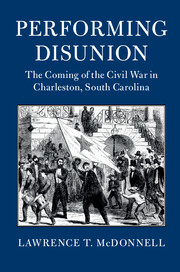4 - The Threat of the Counterfeit
from CONTEXT: THE CITADEL BESIEGED
Published online by Cambridge University Press: 08 June 2018
Summary
A third route taught like lessons. Before the locomotive, when the State Road was new, almost all of Carolina came to Charleston overland, across the sickly swamps north of the city, through the commercial netherworld of taverns, stables, and cotton buyers straddling upper King Street on the Charleston Neck. “Large stores were established there,” artist Charles Fraser remembered, “and, as wagons were the only means of transportation then used, extensive wagon yards were laid off for their accommodation. The cotton, as it came, was either purchased out of the wagons, or bartered for goods, and afterwards resold at a premium to shippers on the Bay.” Three generations before secession, cotton had begun to shape all aspects of the city's existence.
At mid- century, Fraser had forgotten how difficult the overland trek once was. In 1820, Charleston seemed all but besieged by robbers and brigands. “Gangs of white desperadoes occupied certain houses” north of Charleston, journalist William King recalled, and “infested the roads” funneling toward King Street. With “fear and trembling,” travelers scanned the woods, “carrying rifles in their hands,” as they trundled toward the apparent safety of the upper wards. Finally, the mayor deployed militia to stamp out bandits, but ever after wagoners stayed watchful, moving in armed columns and avoiding strangers. They were far from home free. The threat of the counterfeit turned doubly dangerous as rough paths became smooth roads and Charleston's streets and shops beckoned rough men with smooth signs and come- ons.
The coming of crops heralded the gentry's annual return from their plantations, beginning in November, when the Firemen's Parade capped “Gala Week” festivities, and peaking toward the end of February, when Charleston celebrated Race Week.
Schools were dismissed. The judges, not unwillingly, adjourned the Courts, for they were deserted by lawyers, suitors and witnesses. Clergymen thought it no impropriety to see a well contested race; and if grave physicians played truant, they were sure to be found in the crowd on the race ground. Every stable in the city was emptied – every saddle and bridle put into requisition, and those who could procure neither horse, saddle, nor bridle, enlisted as pedestrians.
- Type
- Chapter
- Information
- Performing DisunionThe Coming of the Civil War in Charleston, South Carolina, pp. 67 - 91Publisher: Cambridge University PressPrint publication year: 2018

